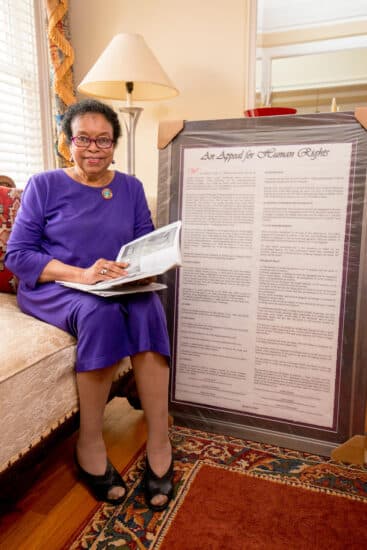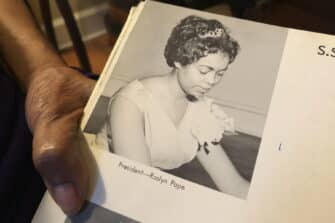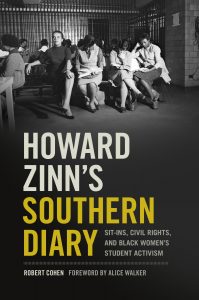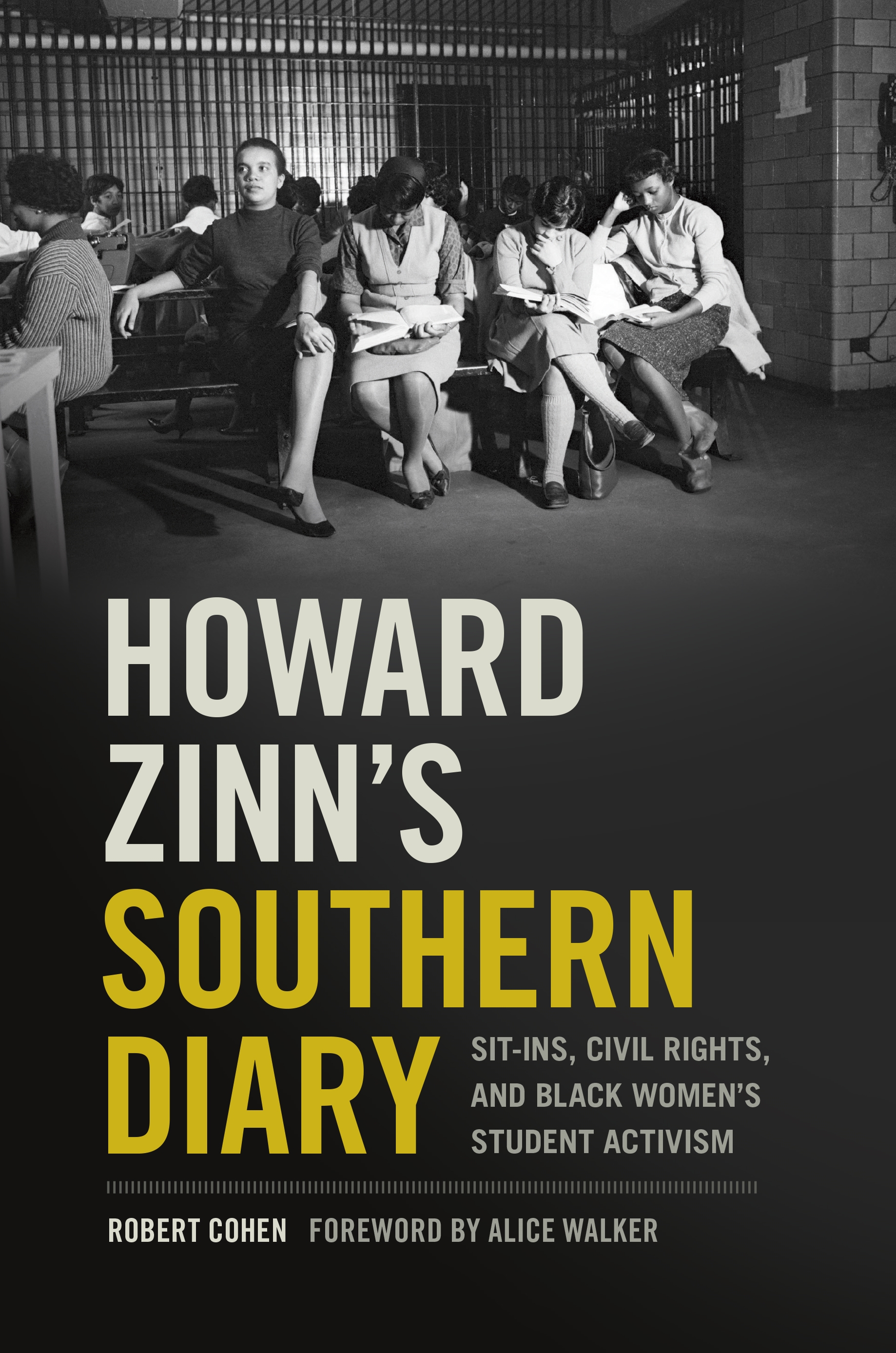 We are saddened to learn of the death of Roslyn Pope (October 29, 1938 – January 19, 2023). Pope was the author, while a student at Spelman, of An Appeal for Human Rights in 1960. In that statement she wrote,
We are saddened to learn of the death of Roslyn Pope (October 29, 1938 – January 19, 2023). Pope was the author, while a student at Spelman, of An Appeal for Human Rights in 1960. In that statement she wrote,
We do not intend to wait placidly for those rights which are already legally and morally ours to be meted out to us one at a time.
Student activists ran the Appeal for Human Rights on March 9, 1960, as a paid advertisement in three Atlanta daily newspapers. The appeal served as preparation and explanation of the sit-in campaign they were about to launch. Read the full appeal at CRMvet.org.
Pope was a student of Howard Zinn’s at Spelman College and active in the 1960s Atlanta Student Movement.
Historian Robert Cohen interviewed Pope on April 16, 2016, for his book, Howard Zinn’s Southern Diary. Here are excerpts from that interview where she shares reflections on the influence of international travel, Zinn, and her parents. We appreciate Cohen for documenting and sharing these words.
Robert Cohen I was wondering if you could elaborate on how your year in France helped pave the way for your anti-racist activism when you returned to Atlanta.
Roslyn Pope Well, I consider that year as the removal of the shackles and my budding realization that the way I had lived the past 20 years had been based on a theory that I was less than human, and that all Black people were less than human. And that therefore “we can’t ride with them on the bus, we can’t integrate the buses, we can’t have them sitting next to us in the cafeterias. We can’t even have them in the cafeterias. We can’t have them coming to our schools.”
The implication was that we were devoid of humanity. Otherwise, we would be free to conduct our lives as whites were free to conduct theirs. So that year in Paris where I experienced that first time that sense of freedom and of being with other people — people who looked like the people in Georgia, but they didn’t have that taint of racism and discrimination built into them. So it was a wonderful liberating opportunity for me.
And when I came back to Atlanta to resume my studies at Spelman, it was as if a cloud had descended. Everything had gone back to the way it was before I had gone to Paris, and I was extremely unhappy. And more than that, I felt stifled because I didn’t know what to do about it. I sat around, I call it looking for a movement. Just waiting for a movement to come out of the blue so that I could express this sense of being less than, and I could move into the kind of life that I had enjoyed in Paris — and throughout Europe — I was located in Paris and studied with the famous Nadia Boulanger, but I traveled throughout Europe into other countries.
So it was a remarkable awakening. And when the Greensboro Four decided to sit in at Woolworth’s and Julian Bond and Lonnie King came up to me the very next day and said “Have you heard about the guys at Greensboro?” I said I had.
They said “We’re going to start a movement here.” It was as if my prayers had been answered. I’m sitting there thinking “Where’s the movement I need to attach myself to?” Fortunately, I had been elected president of the student body at Spelman in absentia, so I was right there ready to be on the front lines.
Cohen Howard Zinn was a huge advocate of international exchange, study abroad, trying to put those college students in touch with the outside world.
Pope Yes, and he was very helpful to me. He even put me in touch with a friend of his who worked with UNICEF. And I was able to live with her my first months in Paris. So he was involved in my getting settled in, and knowing somebody that I could relate to right away.
Cohen Could you say something about how you got to know Howard Zinn and his impact on you intellectually, politically, and personally, whatever memories you’d want to share.

Pope I must have been a sophomore when he came to Spelman. I met him in his history class. And he was very outgoing, warm, and just seemed to be delighted to be in that location where he realized he had a lot to contribute to the growth and the welfare of Spelman students. So I met him in class. And it was enlightening. He felt more like a friend than a professor. And so it was not unusual for people to call him Howard or Howie — not on the first day, but when you got to know him. I was a Howard person. I was never a Howie person.
. . . talking with him about going off to Europe, and having him give us insights and his experiences. He was like a breath of fresh air on the campus because he was totally free and uninhibited in terms of communicating with us. And he did not set himself apart from the students. It was remarkable.
. . . I don’t know if you realize that Julian Bond and I were at Howard Zinn’s apartment to type this [the Appeal for Human Rights]. I had done the draft in long hand. I was not a typist, but Julian and I, Julian had helped to gather the statistics that are in the Appeal. You know, how many policemen there are. How many hospitals, and that sort of thing.
Cohen Yes, it reads very well, as if it was written by a sociologist. It’s very well documented . . .
Pope Yes that seems to be one of the things that my students today that I speak to occasionally [value about the Appeal]. . . And even when I received an honorary degree from Spelman in 2013 and they re-enacted, there was a Spelman student who came out and said, “I’m Roslyn Pope,” and then there were students from other colleges and they were reading the Appeal. I’m drawn to the first part of it and the last part of it, but they were just astounded by the statistical data.
Cohen Yes, for young people who don’t know how great the inequities were under segregation, those statistics would be very striking. But I interrupted you. You were saying that you were at Howard’s apartment, with Julian Bond.
 Pope Yes Julian and I. Yes we were up against a deadline. I had finished it the night before, and we needed someplace to put it in a form where people could actually read it. And so we knew that Howard would help us in any way he could. And there is a wonderful picture of that big, big, enormous typewriter that we were using back in the day. And we went there and he was very open and generous, and that’s where it was typed by Julian. As I was completing the writing of it. We were sort of up against a deadline.
Pope Yes Julian and I. Yes we were up against a deadline. I had finished it the night before, and we needed someplace to put it in a form where people could actually read it. And so we knew that Howard would help us in any way he could. And there is a wonderful picture of that big, big, enormous typewriter that we were using back in the day. And we went there and he was very open and generous, and that’s where it was typed by Julian. As I was completing the writing of it. We were sort of up against a deadline.
Cohen That’s interesting. Were you parents supportive of your activism?
Pope They were. They were just amazingly supportive. There were many parents whose jobs were threatened. And students whose parents were teachers were threatened. Aaron Jarell, who was superintendent of the Atlanta public schools at that time said that any teachers would be fired who had anything to do with the movement. So there were a lot of people who just were afraid to participate.
But my parents were so proud. Part of it was I was writing it at home and at another relative’s house, and I was being cheered on. They thought it was a wonderful idea. And that Christmas following the publication [of the Appeal] my father sent the Appeal — it was surrounded by little holly berries on a Christmas card.
Cohen Wow! Had your parents been activists too? Or did it start with you?
Pope My father had worked at the post office for 40 years. And I just cringe when I think of how his life must have been, born in 1895. He started having children at a late age. And he participated in things like a union of postal employees, Black postal employees came together to make certain demands, and he was president of that. So he had been in organizations that protested the treatment of Blacks in Atlanta, but not overtly, not among white people necessarily.
Cohen But those values were transmitted to you, it sounds like.
Pope Right. Exactly.
Cohen So you felt that you weren’t rebelling against your parents?
Pope No. I wasn’t rebelling against my parents. I was rebelling against the system.
Learn More
In addition to Howard Zinn’s Southern Diary, we recommend Undaunted by the Fight: Spelman College and the Civil Rights Movement, 1957 – 1967.
Below is a clip of Roslyn Pope talking about the Atlanta Student Movement.
Dr. Roslyn Pope – ASM from City of Atlanta on Vimeo.
There is a 45-minute oral history interview with Roslyn Pope in the Kennesaw State University Collections, conducted in 2017.








Twitter
Google plus
LinkedIn